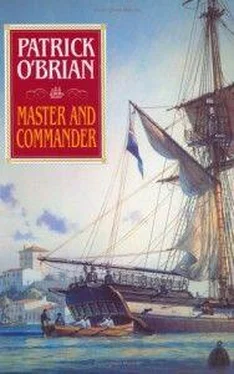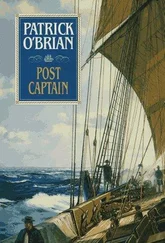'Where is your prodigious great transformation?' he cried. 'Where is this third mast, that is to amuse the enemy? Where is the merriment in practising upon a landman, where the wit? Upon my honour, Mr Farcical Comic, any poteen-swilling shoneen off the bog would be more delicate. Are you not sensible it is very wrong?'
'Oh, sir,' cried Mr Marshall, shocked by the sudden extreme ferocity of Stephen's glare, 'upon my word – Mr Dillon, I appeal to you…'
'Dear shipmate, joy,' said James, leading Stephen to the horse, that stout rope running parallel to the mainmast and some six inches behind it, 'allow me to assure you that to a seaman's eye this is a mast, a third mast: and presently you will see something very like the old fore-and-aft mainsail set upon it as a trysail, at the same time as a cro'jack on the yard above our heads. No seaman afloat would ever take us for a brig.'
'Well,' said Stephen, 'I must believe you. Mr Marshall, I ask your pardon for speaking hastily.'
'Why, sir, you would have to speak more hasty by half to put me out,' said the master, who was aware of Stephen's liking for him and who valued it highly. 'It looks as though they had had a blow away to the south,' he remarked, nodding over the side.
The long swell was setting from the far-off African coast, and although the small surface-waves disguised it, the rise and fall of the horizon showed its long even intervals. Stephen could very well imagine it breaking high against the rocks of the Catalan shore, rushing up the shingle beaches and drawing back with a monstrous grating indraught. 'I hope it does not rain,' he said, for again and again, at the beginning of the fall, he had known this sea swelling up out of calmness to be followed by a south-eastern wind and a low yellow sky, pouring down warm beating rain on the grapes just as they were ready to be picked.
'Sail ho!' called the look-out.
She was a medium-sized tartan, deep in the water, beating up into the fresh easterly breeze, obviously from Barcelona; and she lay two points on their port bow.
'How lucky this did not happen an hour ago,' said James. 'Mr Pullings, my duty to the captain, and there is a strange sail two points on the larboard bow.' Before he had finished speaking Jack was on deck, his pen still in his hand, and a look of hard excitement kindling in his eye.
'Be so kind…' he said, handing Stephen the pen, and he ran up to the masthead like a boy. The deck was teeming with sailors clearing away the morning's work, trimming the sails as they surreptitiously changed course to cut the tart3n off from the land, and running about with very heavy loads; and after Stephen had been bumped into once or twice and had 'By your leave, sir,' and 'Way there – oh parding, sir' roared into his ear often enough, he walked composedly into the cabin, sat on Jack's locker and reflected upon the nature of a community its reality – its difference from every one of the individuals composing it – communication within it, how effected.
'Why, there you are,' said Jack returning. 'She is only a tub of a merchantman, I fear. I had hoped for something better.'
'Shall you catch her, do you suppose?'
'Oh, yes, I dare say we shall, even if she goes about this minute. But I had so hoped for a dust-up, as we say. I can't tell you how it stretches your mind – your black draughts and blood-letting are nothing to it. Rhubarb and senna. Tell me, if we are not prevented, shall we have some music this evening?'
'It would give me great pleasure,' said Stephen. Looking at Jack now he could see what his appearance might be when the fire of his youth had gone out: heavy, grey, authoritarian, if not savage and morose.
'Yes,' said Jack, and hesitated as though he were going to say much more. But he did not, and after a moment he went on deck.
The Sophie was slipping rapidly through the water, having set no more sail and showing no sort of inclination to close with the tartan – the steady, sober, mercantile course of a snow bound for Barcelona. In half an hour's time they could see that she carried four guns, that she was short-handed (the cook joined in the manoeuvres) and that she had a disagreeably careless, neutral air. However, when the tartan prepared to tack at the southern end of her board, the Sophie heaved out her staysails in a flash, set her topgallants and bore up with surprising speed – so surprising to the tartan, indeed, that she missed stays and fell off again on the larboard tack.
At half a mile Mr Day (he dearly loved to point a gun) put a shot across her forefoot, and she lay to with her yard lowered until the Sophie ranged alongside and Jack hailed her master to come aboard.
'He was sorry, gentleman, but he could not: if he could, he should with joy, gentleman, but he had burst the bottom of his launch,' he said, through the medium of a quite lovely young woman, presumably Mrs Tartan or the equivalent. 'And in any case he was only a neutral Ragusan, a neutral bound for Ragusa in ballast.' The little dark man beat on his boat to mark the point: and holed it was.
'What tartan?' called Jack again.
'Pola,' said the young woman.
He stood, considering: he was in an ugly mood. The two vessels rose and fell. Behind the tartan the land appeared with every upward heave, and to add to his irritation he saw a fishing-boat in the south, running before the wind, with another beyond it – sharp-eyed barca-longas. The Sophies stood silently gazing at the woman: they licked their lips and swallowed.
That tartan was not in ballast – a stupid lie. And he doubted it was Ragusan-built, too. But Pola was that the right name? 'Bring the cutter alongside,' he said. 'Mr Dillon,
who have we aboard that speaks Italian? John Baptist is an Italian.'
'And Abram Codpiece, sir a purser's name.'
'Mr Marshall, take Baptist and Codpiece and satisfy yourself as to that tartan look at her papers look into her hold – rummage her cabin if needs be.'
The cutter came alongside, the boat-keeper booming her off from the fresh paint with the utmost care, and the heavily-armed men dropped into her by a line from the main yardarm, far more willing to break their necks or drown than spoil their fine black paint, so fresh and trim.
They pulled across, boarded the tartan: Marshall, Cod-piece and John Baptist disappeared into the cabin: there was the sound of a female voice raised high in anger, then a piercing scream. The men on the fo'c'sle began to skip, and turned shining faces to one another.
Marshall reappeared. 'What did you do to that woman?' called Jack.
'Knocked her down, sir,' replied Marshall phlegmatically. 'Tartan's no more a Ragusan than I am. Captain only talks the lingua franca, says Codpiece, no right Italian at all; Missis has a Spanish set of papers in her pinny; hold's full of bales consigned to Genoa.'
'The infamous brute to strike a woman,' said James aloud. 'To think we have to mess with such a fellow.'
'You wait till you're married, Mr Dillon,' said the purser, with a chuckle.
'Very well done, Mr Marshall,' said Jack. 'Very good indeed. How many hands? What are they like?'
'Eight, sir, counting passengers: ugly, froward-looking buggars.'
'Send 'em over, then. Mr Dillon, steady men for the prize-crew, if you please.' As he spoke rain began to fall, and with the first drops came a sound that made every head aboard turn, so that in a moment each man's nose was pointing north-east. It was not thunder. It was gunfire.
'Light along those prisoners,' cried Jack. 'Mr Marshall, keep in company. It will not worry you, looking after the woman?'
'I do not mind it, sir,' said Marshall.
Five minutes later they were under way, running diagonally across the swell through the sweeping rain with a lithe corkscrewing motion. They had the wind on their beam now, and although they had handed the topgallants almost at once, they left the tartan behind in less than half an hour.
Читать дальше
Конец ознакомительного отрывка
Купить книгу












